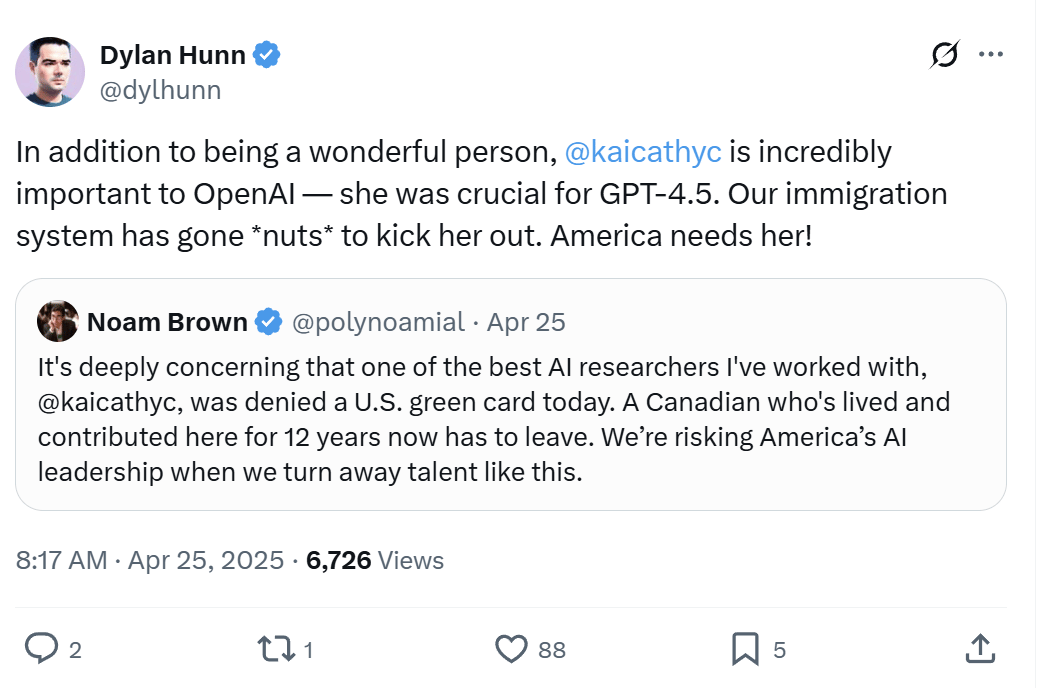
Image Source: ChatGPT-4o
Top OpenAI Researcher Denied Green Card, Raising AI Talent Concerns
A prominent AI researcher at OpenAI, known for her work on GPT-4.5, has been denied a U.S. green card after over a decade of residence in the country. The situation has raised fresh concerns about how U.S. immigration policies may be affecting the nation’s ability to retain top-tier AI talent.
While the researcher, Kai Chen, will continue her work remotely until the issue can hopefully be resolved, the case adds to growing scrutiny over immigration hurdles that may be undermining America’s competitive edge in artificial intelligence.
A Researcher Forced to Leave
Kai Chen, a Canadian citizen who has lived in the United States for 12 years, learned last week that her green card application had been denied and that she must leave the country. Noam Brown, a senior research scientist at OpenAI, publicly shared the news on X (formerly Twitter), expressing alarm at the decision.
“It’s deeply concerning that one of the best AI researchers I’ve worked with […] was denied a U.S. green card,” Brown wrote. “A Canadian who’s lived and contributed here for 12 years now has to leave. We’re risking America’s AI leadership when we turn away talent like this.”
Chen’s colleague, Dylan Hunn, echoed the concern, calling her “crucial” to the development of GPT-4.5—one of OpenAI’s most advanced language models to date.
Industry Reactions and OpenAI’s Response
Although the decision does not cost Chen her position at OpenAI, she will have to leave the U.S. and continue her work remotely. According to Brown, Chen plans to relocate temporarily to Vancouver, Canada, where she will work from an Airbnb “until [the] mess hopefully gets sorted out.” It’s the latest example of how foreign talent continues to face significant barriers to living, working, and studying in the United States.
OpenAI was not directly involved in the green card application, which was filed before Chen joined the company. In a statement, the company noted that preliminary findings pointed to possible paperwork issues with the filing.
“This application was filed some time prior to our employee joining OpenAI and we were not involved in the case,” an OpenAI spokesperson said. “However, our initial assessment based on the information provided to us, shows there may have been some paperwork issues in the filing. We’re continuing to work closely with our employee on their situation.”
OpenAI CEO Sam Altman has previously called for changes to high-skill immigration policy. In a July 2023 post, he wrote: “We desperately need to make it easier for high-skill immigrants to move to the U.S.”
Wider Pattern of Immigration Challenges
Chen’s case reflects broader trends in U.S. immigration enforcement, particularly under the Trump administration, which has implemented stricter reviews and denials of both student and employment-based visas.
Over 1,700 international students in the U.S.—including those in AI and STEM fields—have reportedly had their visa status challenged in recent months. In some cases, individuals have been targeted for minor infractions, such as traffic violations.
While a recent reversal temporarily reinstated certain student visas, the administration has signaled plans to introduce a new system for reviewing and potentially terminating visas for international students.
Additionally, the administration has reportedly suspended green card processing for immigrants granted refugee or asylum status and intensified scrutiny of green card holders perceived as national security risks.
AI’s Global Talent Pipeline at Risk
OpenAI, like many U.S. AI research institutions, depends heavily on international talent. The company has filed over 80 H-1B visa applications in the past year and sponsored more than 100 visas since 2022, according to internal sources.
These visas allow U.S. companies to hire foreign professionals in specialty occupations that require at least a bachelor’s degree or the equivalent—but even these are facing tighter restrictions. Recent changes include increased requests for evidence and personal data and biometrics, raising concerns about rising denial rates.
Immigrants have played a pivotal role in building the U.S. AI sector. A study by Georgetown’s Center for Security and Emerging Technology found that 66% of the top 50 AI startups in the U.S. had at least one immigrant founder. In 2023, the National Foundation for American Policy reported that 70% of full-time graduate students in AI-related fields in the U.S. are international students.
Notable figures in AI—including Ashish Vaswani who came to the U.S. in the early 2000s to pursue studies in computer science, is a co-creator of the transformer model that powers modern AI models like ChatGPT, and Wojciech Zaremba, OpenAI co-founder who earned his PhD in AI at NYU—began their journeys in the U.S. as international students. Their contributions underscore the vital role global talent plays in advancing American AI innovation.
Shifts in U.S. immigration policy, reductions in research funding, and concerns about support for scientific fields have led many researchers to consider relocating out of the country. In a recent Nature poll of more than 1,600 scientists, 75% said they were contemplating moving abroad for career opportunities.
A Call for Smarter Immigration Policy
As the global AI race accelerates, the United States faces a critical question: Will its immigration system support or stifle innovation?
The denial of Kai Chen’s green card highlights the real-world consequences of current policies. For U.S. AI leadership to remain strong, advocates say immigration reform must prioritize access for high-skill researchers, scientists, and engineers.
With more researchers contemplating relocation, the U.S. risks losing not only individuals—but the momentum of an entire field that depends on global collaboration.
Editor’s Note: This article was created by Alicia Shapiro, CMO of AiNews.com, with writing, image, and idea-generation support from ChatGPT, an AI assistant. However, the final perspective and editorial choices are solely Alicia Shapiro’s. Special thanks to ChatGPT for assistance with research and editorial support in crafting this article.



